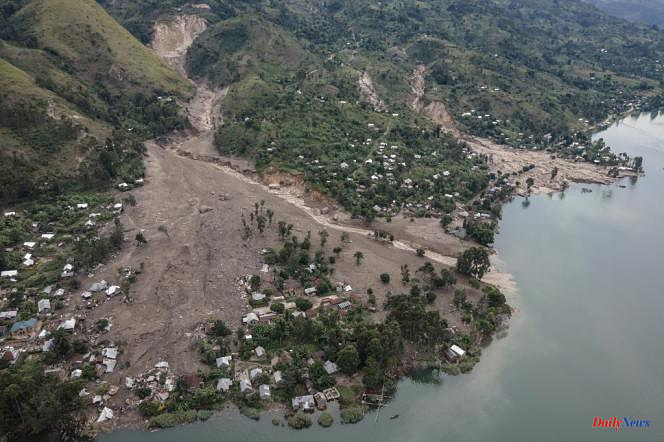There is nothing left of the cassava, bean and sweet potato plants of Niampaka Kahundahunda. The plot, like much of the village of Bushushu, located on the western shore of Lake Kivu in eastern Democratic Republic of Congo (DRC), was devastated by flooding. Thursday, May 4, the 48-year-old farmer was having a drink in a diner with some friends when the torrents of mud swept through. 438 people have been buried according to the authorities - a still provisional toll - and several thousand people are still missing.
Like Niampaka Kahundahunda, more than 100,000 survivors have fled the affected localities, according to a report by OCHA, the UN humanitarian affairs office, published the day after the natural disaster. The gnarled family man first retreated to the mountains, near his plot of land. "There were still rockslides there, so I tried to flee to a safer place," he said, his eyes darkened.
Six days after the disaster, he finally found refuge with his wife's mother, in Ihusi in Kalehe territory, with his wife and son, the only survivor of eight children. The farmer's in-laws also live off the land, but the harvest is barely enough to feed three more mouths. “Our biggest challenge right now is hunger,” he laments.
“At this time, it is difficult to take stock of the number of hectares ravaged, notes Archimède Karhebwa, deputy administrator of the territory. But what is certain is that we will not be able to cultivate there anytime soon. Sand and stones disturb the fertility of the soil." A warehouse of seeds stored for the next harvests was also destroyed in the floods.
Prices have exploded
Nothing stopped the three flows of rain, rocks and pebbles that washed away homes and crops in the province of Kalehe. The forests that previously covered the mountain sides of the valleys on the shores of Lake Kivu have disappeared. In this densely populated agro-pastoral region, the pressure on the soil is strong. “For the needs of agriculture or livestock, the area was deforested without reforestation. Even when seedlings are distributed free of charge, they are rarely replanted,” said Chance Muhindo Kafunga, local coordinator of Congolese NGO Environment Without Borders.
In Bushushu, a few tomatoes or bundles of cassava flour are still sold on the market stalls. But the prices of basic necessities have exploded: around 30% increase, according to a report by the local branch of Caritas, a confederation of NGOs linked to the Catholic Church.
“There is almost no charcoal left [indispensable for cooking in the region]. The only remaining bags are sold for 30 dollars [some 27 euros] instead of 15 or 20 dollars,” laments a saleswoman who did not give her name in front of an almost empty fish stand. Fishing has been temporarily banned by local authorities while rescuers recover bodies from the lake.
A few kilometers away, the market of Nyamukubi, another village affected by the floods, was completely submerged. “However, it was the second most important in the territory, specifies Archimède Karhebwa. People came from all over to buy or sell their wares. »
Drinking water sources damaged
Simon Lwahissa, who worked there, could not save his stocks. Standing in front of what remains of his house – a pile of chopped wood – he does not have the strength to go to the port of Nyamukubi where a wealthy businessman has sent food for the survivors. However, the trader has had neither to eat nor to drink since the sources of drinking water were damaged by the disaster. Assistance from the government, private donors or NGOs, which in places has provoked fights and crowd movements, arrives in dribs and drabs.
"I'm just waiting for the authorities to find solutions for us. All our infrastructure was lost: the school, the health center, the church. We don't even have electricity since the micro hydroelectric dams were destroyed," says Simon Lwahissa. The resumption of its commercial activity is not on the agenda, especially since the national road 2, which connects Bukavu and Goma, the two main cities in the east of the DRC, is cut off. Even on a motorbike, the passage is in places impossible as the rocks, brought by the torrential rains, obstruct the way.
Kalehe was however one of the granaries of the region. The area, which yesterday supplied part of the provinces of North and South Kivu with market gardening products and charcoal, is now isolated and difficult to supply. The rains demolished the Luzira bridge, the only road linking the territory to the rest of South Kivu province.
In front of the ruined footbridge, the handlers unload their goods. Some take the rickety wooden pontoon hastily rebuilt by the locals. Others go directly by the river, boxes on their heads. Opposite, another truck, one of the few in the area, is waiting to supply the affected area.












